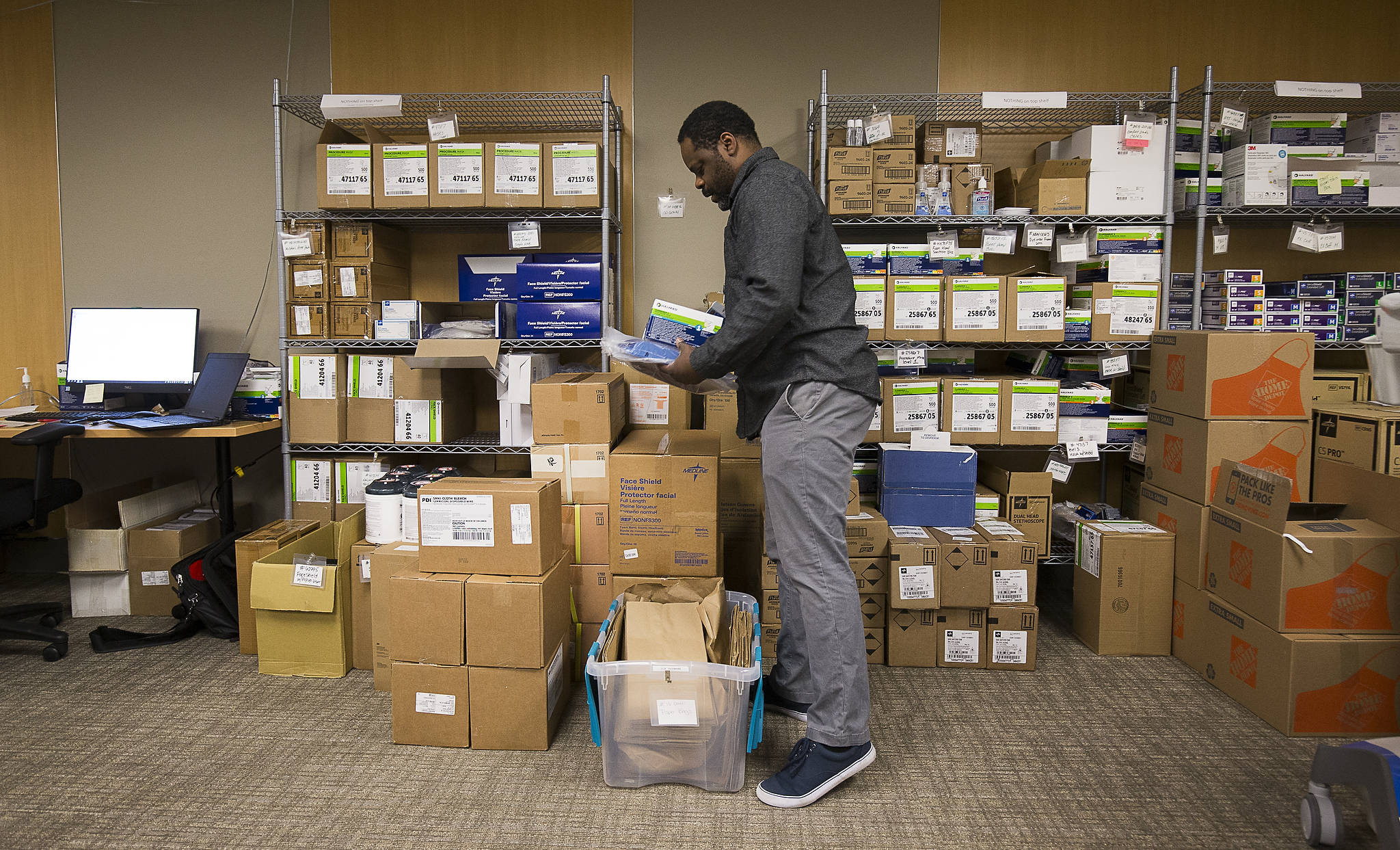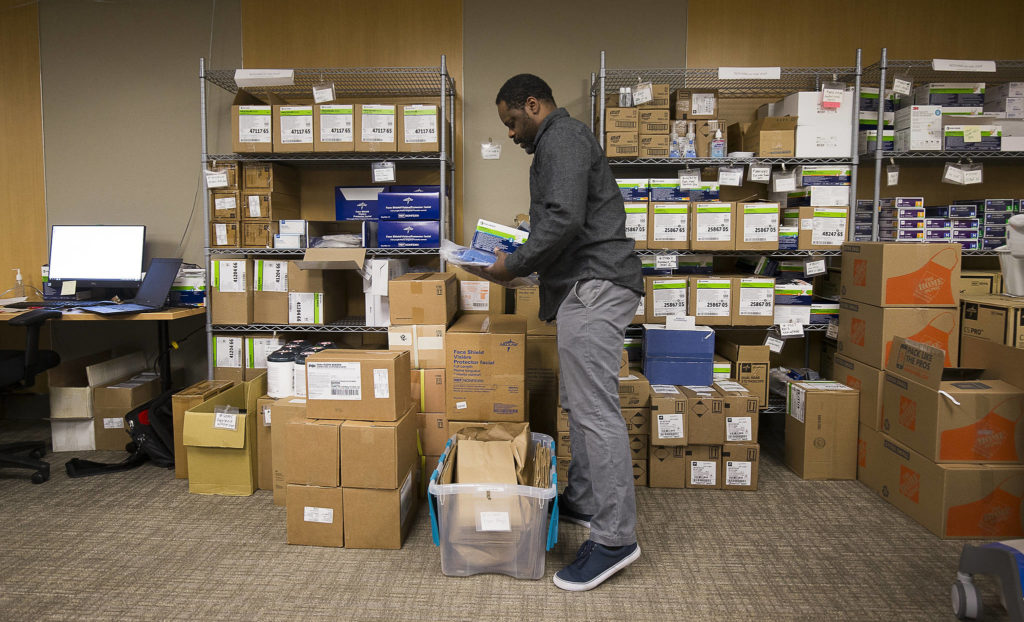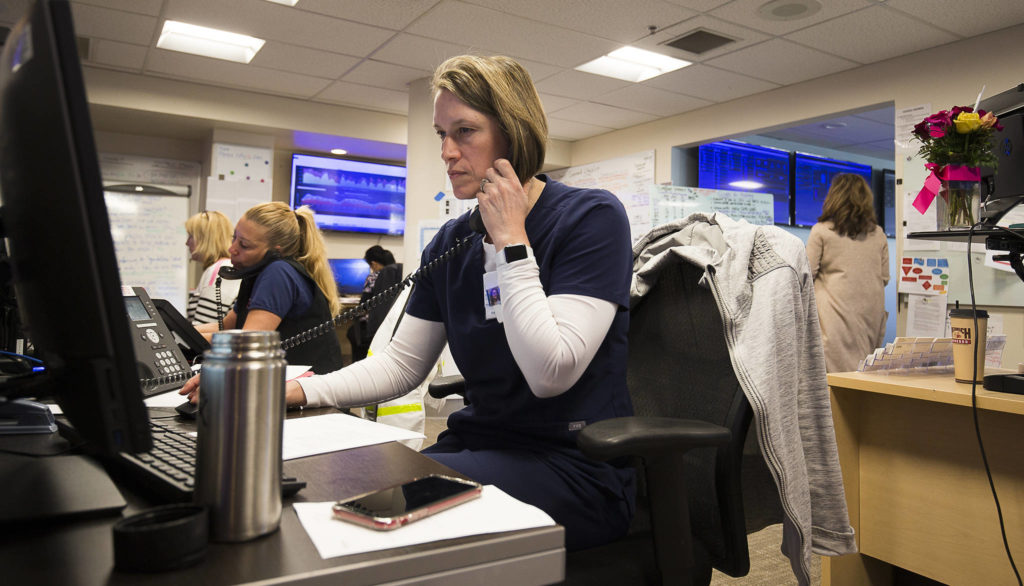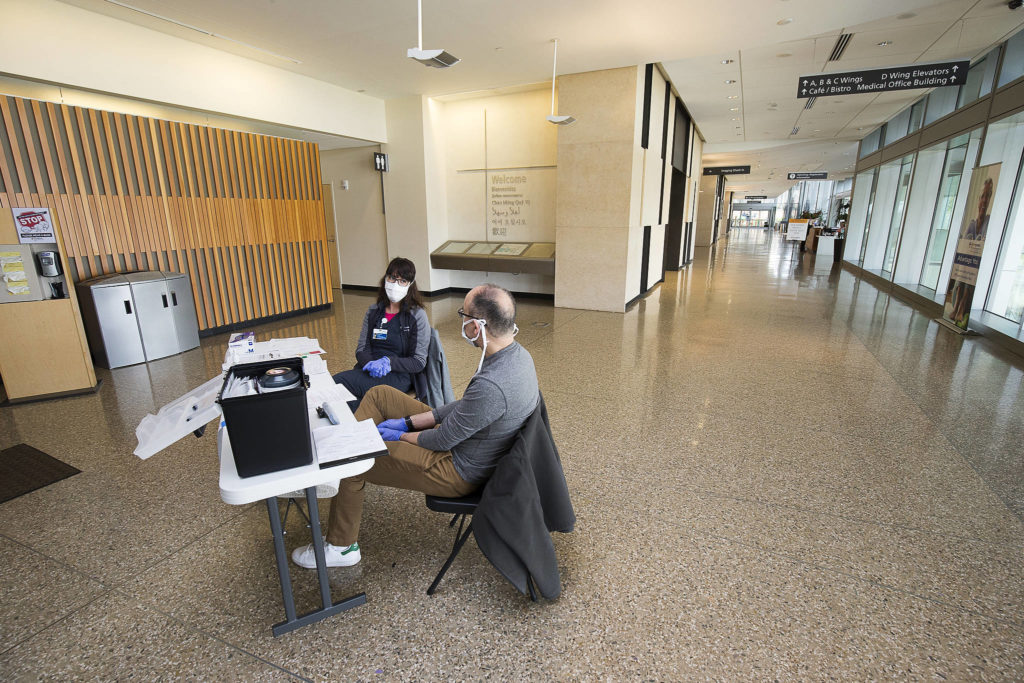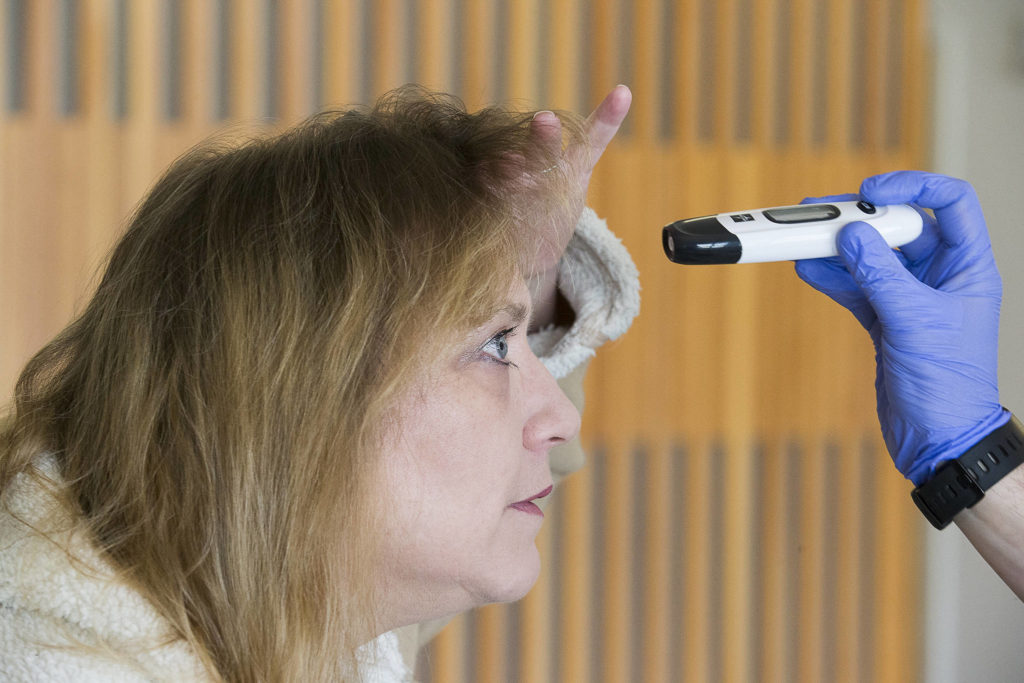EVERETT — A flood of COVID-19 patients could overwhelm Snohomish County’s four acute-care hospitals in coming weeks, exhausting supplies, jeopardizing health care providers and potentially requiring physicians to make life or death decisions about who gets care.
“If it’s too horrendous, at some point it’s going to be beyond us to respond and people will have to make hard decisions about who gets treated and who doesn’t,” County Executive Dave Somers said.
Between them, Providence Regional Medical Center Everett, Swedish Edmonds, EvergreenHealth Monroe and Cascade Valley Hospital in Arlington, operate 721 staffed hospital beds, according to the Washington State Hospital Association. Of those, only 87 are intensive care unit beds, the type most likely to be needed for severe COVID-19 cases. And many of those beds already are full.
As of Saturday, the number of those confirmed or presumed positive for the virus in Snohomish County stood at 447, including 10 fatalities. But a continuing shortage of testing kits almost guarantees that more have been infected. Modeling studies of the current regional outbreak suggest that several thousand infections have occurred already and that without intervention, incidence will continue to double every 5 to 7 days, with an estimated cumulative 25,000 total infections in Snohomish and King counties occurring by April 7, according to the Snohomish Health District.
Not everyone who contracts the coronavirus will require hospitalization or even a trip to the emergency room. But as the numbers grow, so too will the number of critically ill needing intensive treatment, including help with breathing.
In short supply is protective equipment like masks, gowns and gloves used by medical providers as well as mechanical ventilators and the trained staff needed to operate them. Ventilators feed oxygen to the lungs through a tube inserted down the throat.
The county’s hospitals are taking measures to try to prepare for the influx. All four activated their emergency operations plans and are continually reviewing staffing, supplies and available space. They’ve stopped outpatient programs, built isolation rooms and beefed up security. They’ve requested protective equipment and ventilators from the national strategic stockpile, the nation’s largest supply of potentially life-saving pharmaceuticals and medical supplies for use in a public health emergency severe enough to cause local supplies to run out.
“I’m very reassured at this point at the foresight and proactive thinking and actions of the health care community,” said Dr. Chris Spitters, the health district’s interim health officer. “Certainly I would say this is the grandest-scale public health event in my 25 plus years in working public health and medicine. I’m inspired and reassured. Everybody is chipping in and taking this seriously.”
Nobody knows
It’s unclear when the expected wave of hospital patients might hit Snohomish County.
“We’re trying to assess that right now,” said Shawn Frederick, the health district’s administrator.
In a letter to President Donald Trump last week, Gov. Jay Inslee wrote that he anticipated the state’s hospitals would “be in crisis by the end of the month.”
On Thursday, Inslee ordered a temporary halt on non-urgent medical and dental procedures to preserve protective equipment. The order, in effect until May 18, applies to any non-urgent procedure that requires medical professionals to don such gear. That would cover most joint replacements, cataract surgeries and cosmetic procedures.
An elective surgery can be done if delaying it would cause harm to the patient within the next three months, according to the proclamation. And it does not apply to patients who suffer a heart attack or stroke or are injured in a motor vehicle accident. Nor does the ban apply to situations such as a patient who requires care by their dentist to relieve pain or manage an infection.
Inslee asked that a U.S. Navy hospital ship be sent to the Puget Sound region to treat routine medical emergencies and thus free up hospital beds for COVID-19 patients.
After discussions with leaders of her medical, clinical and operations staffs, Kim Williams, chief executive officer at Providence Health & Services Northwest, believes the surge will “ramp up” in mid-April.
Sarah Zabel, chief operating officer for Swedish Edmonds, ventured sometime between now and May.
“But I don’t know if anybody really knows,” she added.
Taking stock
At Providence, the county’s largest hospital and intensive care unit with 48 beds, preparations for the surge have been underway for weeks, Williams said.
That included figuring out how to create more ICU beds, configuring patient isolation rooms with negative airflow to contain the virus and determining how many critical care patients requiring isolation can be managed in what has not historically been an intensive care unit.
Providence hopes to add an additional 32 ICU beds in the next couple of weeks and add more trained ICU and respiratory staff and, in some cases, train nurses to do procedures normally done by respiratory staff, Williams said
It’s a similar story at Swedish, which increased its number of ICU beds from 13 to 33 and “is looking for ways to go significantly beyond that,” Zabel said. It increased its number of negative pressure rooms from eight to 28.
At EvergreenHealth Monroe, staff moved quickly following an outbreak at another Evergreen facility in Kirkland to create negative pressure rooms at the 31-bed hospital. They had two, now have six, including the hospital’s four-bed ICU, and in the next week will have the fans and special air filters to add four more.
They’re also looking at increasing the number of ICU beds.
“A lot of it is staffing,” said Dr. Midori Larrabee, the Monroe hospital’s chief medical and quality officer, noting the specialized caregivers ICUs require.
Much of Evergreen’s staff is being cross-trained to take on additional duties, Larrabee said. Many employees are volunteering to work extra shifts and doctors from other specialties are offering to help with coronavirus patients.
“Everybody is rallying together,” she said. “It’s heartwarming. We all want to take care of our community.”
In most major catastrophes, such as earthquakes, hurricanes or floods, the national disaster management system is designed to pour resources into the effected region, including equipment and people, from other parts of the country.
This time, with the virus affecting every state, Williams is planning to ride it out alone.
“That doesn’t mean we aren’t asking for help,” she said. “I just don’t know if there will be help to be had.”
In short supply
Meanwhile the number of COVID-19 patients treated in the Providence ICU continues to steadily rise. As of Thursday, 43 of Providence’s 48 ICU beds were occupied and about a third of those were either confirmed COVID-19 patients or patients awaiting test results for the virus, Williams said.
The same is true at Swedish, whose ICU beds have been completely full at times this week. Zabel was uncertain how many of those were COVID-19 patients.
“It has been gradual so far, but it has been continuous,” Zabel said of the rise of such cases.
Williams said the lack of protective equipment at her hospital eased in recent days but that the staff continues to do intensive planning and training on procedures for using their equipment and materials in the most efficient way possible.
“We have had really heartwarming contact from members of the community who are making donations,” Williams said, including Wednesday when the hospital received 2,500 N-95 respirator masks from Superior Insulation and Thursday when they received another 500 from Dick’s Drive-In.
Evergreen has conserved supplies for weeks, Larrabee said. She gets a report once or twice a day detailing what supplies were used the day before and the next anticipated delivery date.
“We’re OK right now, but anticipating for a shortage in the future,” she said.
Ventilators, on the other hand, remain in short supply.
As of Thursday, Providence had 50 ventilators, 22 of those in use. Another 11 were scheduled to arrive Friday.
Swedish has 23 ventilators and is renting more. Ten are to arrive Monday.
Evergreen also is shopping to add to the five ventilators they have.
Coordinated response
At the health district, Frederick said he was looking to add temporary staff to assist with planning for the surge, such as determining hospital needs and coordinating patient movement to assure an adequate number of beds are available. District staff already are assigned to a county-wide emergency coordination center where the overarching planning for the surge is taking place.
“It’s difficult work,” Frederick said.
The state health department is providing guidance on how to preserve and allocate resources, reducing barriers to bringing in emergency workers, such as retirees, medical students and others that might provide hospitals relief and searching for additional ventilators, the pharmaceuticals required for their use and the staff to administer them.
“We want to bolster the workforce with the skill set necessary to provide the health care required now,” said Erika Henry, the department’s healthcare preparedness lead.
As of last week, the state Department of Enterprise Services had located about 30 percent of the needed items they’d been asked to find, such as hand sanitizer, disinfecting wipes, face shields and gowns.
“There’s definitely more to do,” said department spokeswoman Linda Kent. “It’s a big challenge and things are changing day by day.”
Many of the state’s 12,000 hospital beds currently are occupied by Medicaid patients who have completed their care and no longer need to be there, according to the state hospital association. The state needs to work more quickly to assess those patients and move them into community facilities such as adult family homes, long-term care centers or home health care, a process that can sometimes take months, the association said.
Swedish is housing 25 patients without a medical need, Providence about 80.
“It’s typical,” Williams said. “It’s much more problematic when we think we’re looking at volumes that are going to exceed our bed capacity.”
Miraculous work
Most needed going forward won’t be material or machine, but flesh and bone — healthcare providers.
“That’s our most valuable resource,” said health district chairwoman Stephanie Wright.
Keeping them healthy is critical to containing the outbreak. As of Friday, nine Snohomish County health workers had tested positive for the virus, including several who worked at the Life Care Center in Kirkland, the long-term care center that has been an epicenter of the outbreak.
“Healthcare workers will get infected and we continue to identify that as a major risk factor,” said Spitters, the interim health officer.
Providence is taking several steps to keep people on the job, including providing a drive-through service where any caregiver showing symptoms can be tested.
“They are doing miraculous work and pulling together,” Williams said. “They come to work with the same hopes and fears as the rest of us and they’re here taking care of patients each and every day.”
Swedish Edmonds also is taking employee temperatures daily and this week opened an on-site clinic to test caregivers.
At EvergreenHealth Monroe, staff received refreshers on proper procedures for using protective equipment, screening patients and using isolation rooms to prevent spread of the virus. They also are screening all staff twice a day for temperature and symptoms. Larrabee said she was unaware of any Evergreen staff testing positive for the virus. The hospital also is offering mental health services to employees.
“We need to make sure our healthcare workers can deal with the stress,” Larrabee said. “They have home lives, too.”
At a Board of Health meeting last week, one member asked if the National Guard might provide some relief for healthcare workers.
But Frederick noted that the medical capacity in the Washington guard is limited and that many of those who serve in such units work in the healthcare field in civilian life.
“Using the National Guard in that capacity would weaken capacity in the existing healthcare system,’’ he said.
The hospital administrators recognize that difficult times and wrenching choices may lie ahead.
“We really see ourselves as part of the fabric of community and the thought of getting to a situation where we can’t provide care for our communities is terrifying,” Zabel said.
At Providence, Williams said administrators met with the hospital system’s ethicist last week and will again this week to develop a decision-making process to determine which patients receive priority for treatment should it come to that.
“That’s kind of one of the really heartbreaking things about these situations,” Williams said.
Zabel agreed.
“Nobody wants to make those decisions,” she said.
In the end, the biggest key to an effective response will be ourselves.
“A lot of this depends on the citizens and community being responsible for their own behavior,” Williams said. “There’s still too many people who believe this is a kind of cold and social distancing doesn’t mater.”
“This,’” she said, “is very serious.”
Herald writer Jerry Cornfield contributed to this story.
Talk to us
> Give us your news tips.
> Send us a letter to the editor.
> More Herald contact information.
